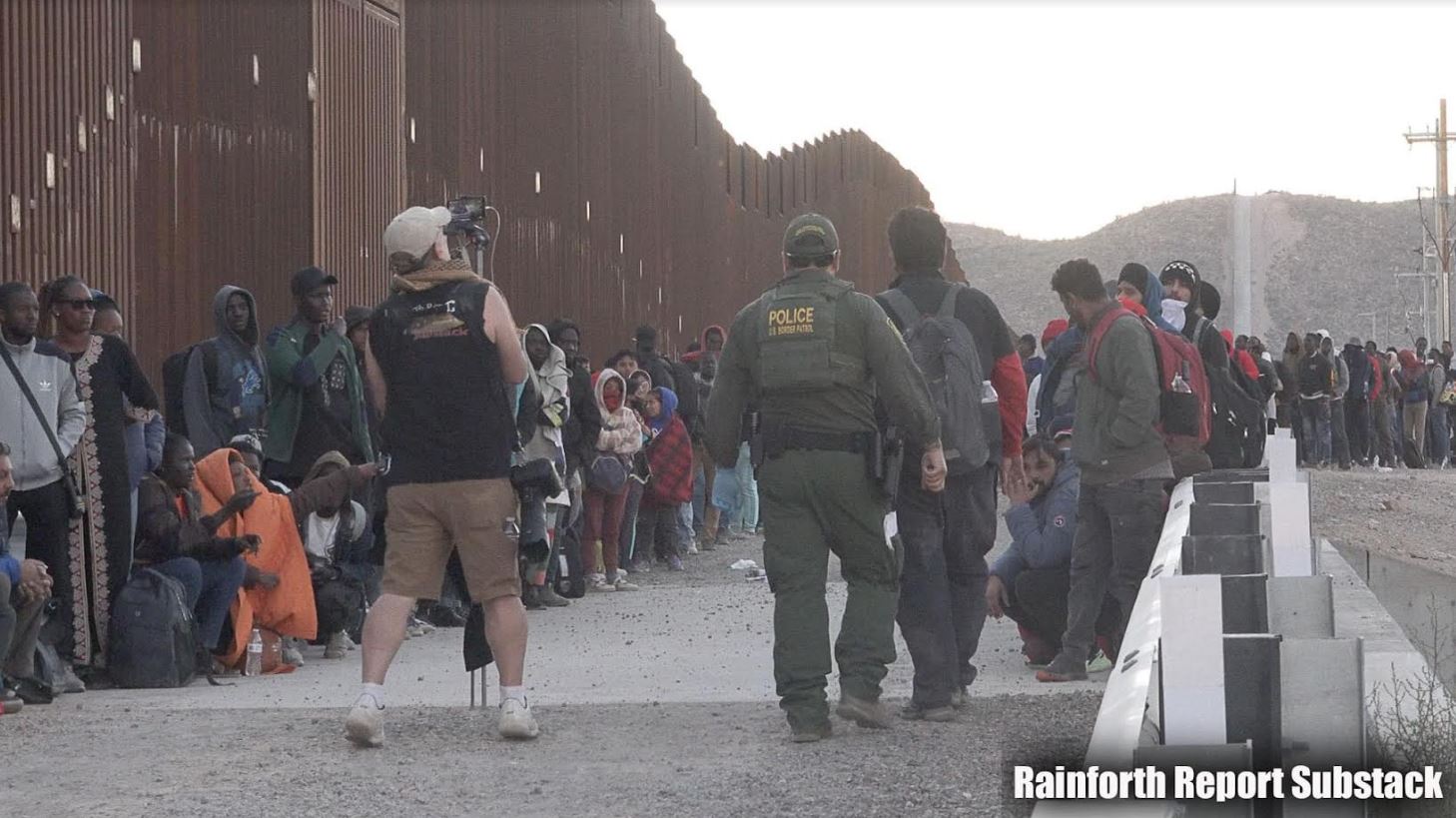
Senate leaders on Sunday released details of a long-awaited comprehensive border security bill, which also contains a large foreign aid component.
The discussions, led by Senators James Lankford (R-Oklahoma), Krysten Sinema (R-Arizona), and Chris Murphy (D-Connecticut), come after months of negotiations with the Biden regime, seeking to address the ongoing crisis in the Senate. The southern border of the United States and foreign policy commitments abroad.
The 370-page deal, according to Sen. Patty Murray (D-WA), chairwoman of the Senate Appropriations Committee, claims to reflect weeks of good-faith negotiations, balancing domestic concerns with urgent international aid needs.
“With ammunition running out to repel Putin's brutal invasion of Ukraine, it is imperative that we finally offer our support,” Murray said in a statement.
As reported Critic portalThe comprehensive $118.28 billion national security supplemental package, totaling $118.28 billion, allocates a staggering $60.06 billion to Ukraine in response to Russia's aggressive military actions.
In contrast, $20.23 billion has been allocated to US border security efforts. This disparity in funding allocation has raised eyebrows and sparked debate about Senate priorities at a time when security challenges continue at local borders.
According to Murray, the $118.28 billion national security supplemental package includes:
- $60.06 billion to support Ukraine in its fight against Putin's bloody invasion and protect its people and sovereignty.
- $14.1 billion in security aid to Israel.
- $2.44 billion to support operations at US Central Command and address combat expenditures related to the conflict in the Red Sea.
- $10 billion in humanitarian assistance to provide food, water, shelter, medical care and other essential services to civilians in Gaza, the West Bank, Ukraine and other populations trapped in conflict zones around the world.
- $4.83 billion to support key regional partners in the Indo-Pacific region and deter aggression by the Chinese government.
- $2.33 billion to continue supporting Ukrainians displaced by Putin's war of aggression and other refugees fleeing persecution.
- Bipartisan border policy changes negotiated by Senators Chris Murphy (D-Conn.), Kyrsten Sinema (R-Ariz.), and James Lankford (R-Oklahoma).
- $20.23 billion to meet current operational needs and expand capacity at our nation's borders, provide resources for new border policies included in the package, and help stem the flow of fentanyl and other drugs.
- the The Fentanyl Elimination and Deterrence Drug (FEND) Off Fentanyl Act.
- $400 million for the Nonprofit Security Grant Program to help nonprofits and places of worship make security improvements.
Reno Senator James Lankford (R-OK) issued the following statement today:
“In the past four months, the United States has seen the highest number of illegal border crossings each month, with December setting a US record of more than 300,000 illegal border crossings — an average of nearly 10,000 people per day.” In December alone, nearly 45,000 people crossing our southern border received work authorization and parole status on the day of their arrival as a “reward” for crossing at the port of entry, which incentivizes more people to come.
“Our immigration hearings have been backlogged for years, allowing millions of noncitizens to wander across our country. In the past three years, more than 8 million people have crossed our southern border illegally, costing our nation billions of dollars and bringing record levels of fentanyl, crime and homelessness.” .
“Even if President Biden doesn't acknowledge it, this is a crisis. We must secure our borders now. He can't wait any longer.
“Americans do not oppose legal and orderly immigration, but they are tired of the chaos and abuses at our borders. I am pleased to announce that we have finally finished the text of a strong bill to add to the supplemental funding bill. Although most Senators have already been briefed on the contents of the bill, However, the final text will be distributed to senators soon and published online within one day.
“The Border Security Bill will put a slew of new enforcement tools in the hands of the future administration and push the current administration to finally stop the flow of illegals. The bill provides funding to build the wall, increase technology at the border, add more detention beds, more agents, and more Deportation Flights. The Border Security Bill ends parole abuse at our southwest border that has been waived by more than a million people. It dramatically changes our arcane asylum laws with speedy checks held to higher standards of evidence, limited appeals, and speedy deportation.
“New restrictions on asylum eligibility will prevent criminal gangs from taking advantage of our currently weak immigration laws. The bill also includes new emergency powers to close the border when crossing borders, new hiring powers to quickly increase the number of officers, and new hearing powers to quickly enforce consequences for illegal crossings. It changes our borders from arrest and release to detention and deportation.
“Our immigration laws have been weak for years. This is a once-in-a-generation opportunity to close our open borders and give future administrations the effective tools they need to stop border chaos and protect our nation.”
The proposed bill gives the Secretary of Homeland Security unprecedented emergency powers to manage unusual immigration events at the US border. This new “Border Emergency Authority” is specifically designed to respond to surges in migration that overwhelm existing border security and immigration processing capabilities.
The legislation sets clear thresholds for activating this emergency power.
According to the summary of the draft law, the “Border Emergency Authority” maybe May be exercised if the cumulative average number of encounters of inadmissible aliens over a 7-day period is between 4,000 and 5,000 per day and He should You should practice if your 7 day average is above 5000 per day. The exercise of power is also required If the number of meetings per day exceeds 8,500. Unaccompanied minors from non-adjacent countries are not included in the total number of encounters for purposes of this section.
Here's how it works in simple terms:
- If the average number of people showing up at the border without entry is 4,000-5,000 people per day, over the course of a week, the government could decide to use this special tool.
- If the average number exceeds 5,000 people per day, the government must use it.
- Also, if more than 8,500 people show up on any given day without permission, the government should use this tool immediately.
But there is an important exception: Children who come to the border alone from countries that do not border the United States are not counted in these numbers.
more:
- When emergency authority is authorized, the Secretary has the authority to prohibit entry into the United States of all individuals, except unaccompanied minors, between ports of entry, and may only screen individuals for eligibility to withhold removal or protection under the Convention against Torture. He tortures. At the same time, U.S. Customs and Border Protection is required to continue processing at least 1,400 inadmissible aliens per day through Southwest land ports of entry under expedited removal or non-custodial 235B removal procedures under this title, ensuring continued access to the Asylum is available.
- Requires the Secretary to suspend the exercise of emergency border authority within 14 days of the 7-day average number of encounters falling to less than 75% of the total number of applicable encounters that initially permitted the Secretary to exercise border emergency authority.
- It stipulates that the Authority shall not be activated for a period exceeding 270 days in the first calendar year, 225 days in the second calendar year, and 180 days in the third calendar year.
- Authorizes the President to suspend the border emergency on an emergency basis for up to 45 days if it is in the national interest.
- Provides that the United States District Court for the District of Columbia shall have sole and original jurisdiction over any challenge arising from the Secretary's authority to exercise emergency border authority.
- Imposes a one-year ban on any alien who has been deported two or more times under emergency border authority.
The new bill would also provide a work permit: “Requires that the alien first pass a credible high fear and barrier standard to obtain a work permit if the alien is released from custody after a credible positive fear screening. This provision does not create a right to release from detention, or a right In obtaining a work permit for aliens who have crossed the border illegally, or modifying the work authorization process for any alien who is not screened under the high and reliable standard of fear. This ruling changes current law, which allows an alien to obtain a work permit simply by submitting an asylum application without screening, “Let the foreigner now be required to first pass a high and reliable fear screening and all asylum bars – including the persecution bar, criminal bars, terrorism bar, fixed resettlement bar, and internal transfer bar – before obtaining a work permit.”
Read a summary of the bill below:

